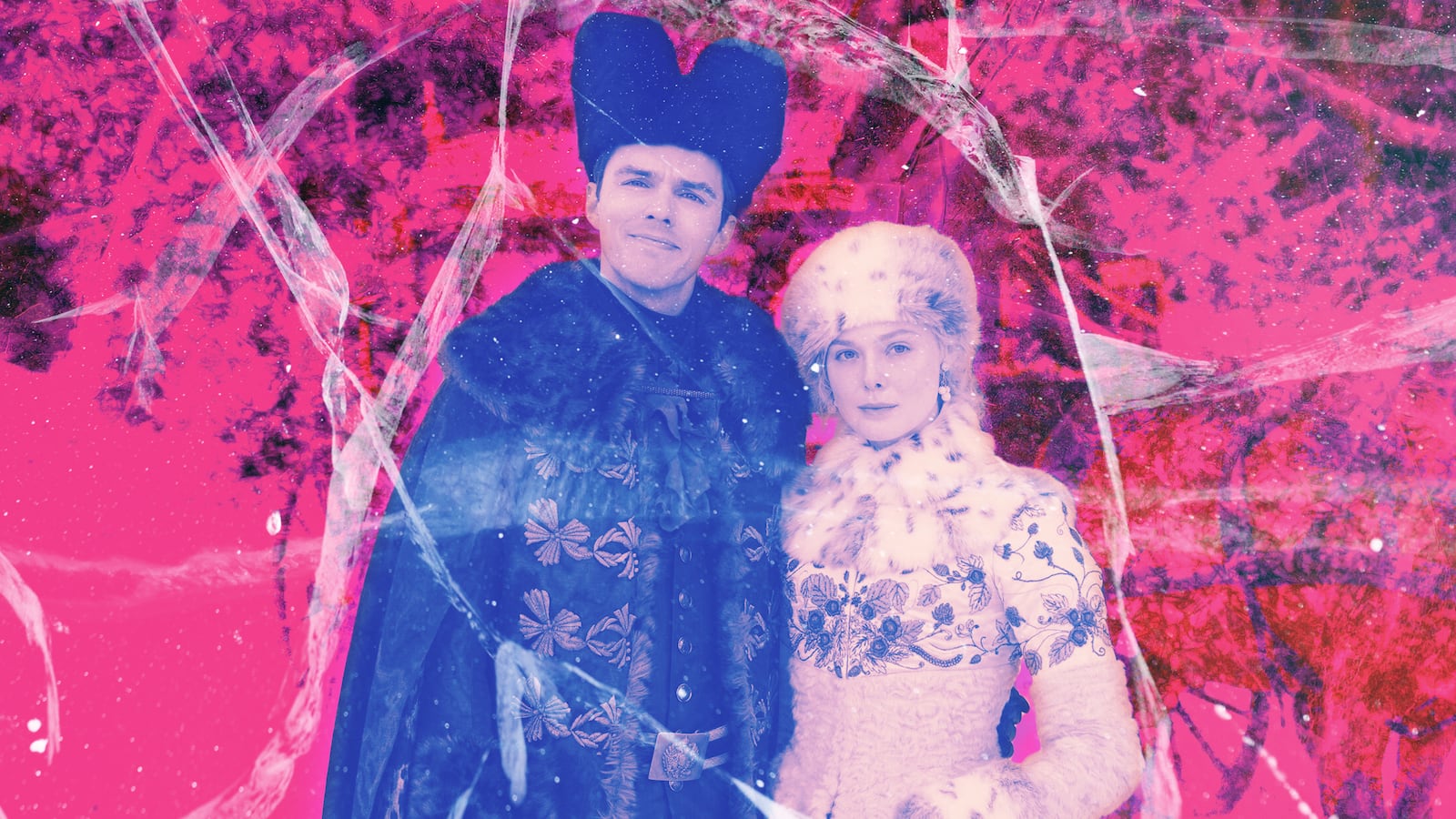This post contains spoilers for The Great Season 3, Episode 6.
For three seasons, one word has defined The Great, Hulu’s pastel-dyed comedy about Russia’s “Enlightened despot” Catherine the Great—huzzah!
Nicholas Hoult’s Peter III and his court seem to punctuate everything with that word, whether it’s a champagne glass shattering against the floor, an arch statement over a bowl of dewy strawberries, or an abrupt change of law. Elle Fanning’s Catherine the Great learned that quickly when she arrived; no matter how awful things get for her or anyone else on this show, the cracks often stay hidden behind a mask. Rage and violence are acceptable in this world, but not sadness.
So, what does everyone do when their favorite unseated ruler to hate meets a tragic, unspeakably silly end? That’s what the second half of the season is all about, after Peter’s shocking and deadly plunge through thin ice in Episode 6.

The Great Season 3, Episode 6—aptly titled “Ice”—highlights the command of tone that has always made The Great, well, great. Peter’s death plunges his court into a kind of emotional turmoil that no one, least of all his ambitious wife, Catherine, can process. Unspoken grief has lurked in this show’s shadows since Season 1, and with Peter’s death, it’s all finally coming out. (Now that’s worth a “huzzah”!)
Much like Logan Roy’s death in this year’s final season of Succession, Peter’s death is a triumph of anti-climax. This ridiculous and intentionally underwhelming farewell for an incomprehensibly powerful character whose global impact underscores the inescapable truth that he, like everyone else, is human, even if the branding convinced a few folks otherwise.
The death itself is not that surprising; many viewers likely knew going in (or have read at some point during the show’s run) that the real-life Peter III also met an untimely demise. But true to The Great’s “occasionally true” storytelling, show-Peter’s death goes in a completely different direction—which is just as well, since the exact circumstances of real-life Peter’s passing remain murky. No matter who someone is, you never expect them to fall through the ice at the end of a pivotal scene.
Hoult has long excelled at playing assholes and weirdos, and The Great’s Peter III is no exception. At the same time, his character’s grief has been a running thread throughout the series. We saw it in the show’s third episode, when the court welcomed the construction of a new, hulking statue of his father—Peter the Great. At the time, it seemed like Peter III simply felt dwarfed by his father’s accomplishments as he fell asleep in the statue’s arms.
Over time, however, the series has complicated that legacy with revelations like his abusive behavior toward his son. Peter III’s father has appeared to him sporadically since last season, when he hallucinated him in a hole he’d dug for Catherine while she was giving birth—part of a morbid tradition. Then, as is apparently usual, Peter III imagined his father calling him a great disappointment.
Unfortunately, no one can really be themselves at court in this series—or at least, no one feels they can expose their vulnerabilities. More often, they shoot each other in the abdomen, exchange ludicrous gifts like live bears, and/or drink themselves into oblivion.
This deceitful environment only makes things worse for Catherine, a newly single mother and empress who cannot comprehend the absolutely absurd manner in which her husband just died. Witnesses to Peter’s death also included his best friend, Grigor (Gwilym Lee)—who refuses to indulge Catherine’s denial for long.

Still, for a full episode following Peter’s death, we observe Catherine partying with the same abandon that Peter once did, and that she hated so much. As Nick Schager noted in his Daily Beast review of The Great Season 3, Peter and Catherine’s bond was always at once undeniable and doomed. He represents the past, and the institutions that granted him his power in the first place, while she represents a more intellectual future that can only exist if at least some of those institutions crumble. What happens now that he’s gone?
For a full episode after Peter III’s death, Empress Catherine is in denial—playing games and furiously avoiding her grief. After speaking with Peter’s aunt, she becomes convinced she’s imagined things, even though she knows deep down what she saw. Before long, however, Grigor can’t take it—and no moment in Season 3 hits harder than the closing shot in Episode 7, “Fun,” when the court finds out at Peter’s death in the same moment that Catherine finally feels it.
Elle Fanning is stunning in that scene, as she quakes while holding herself still, face crumbling behind the eyes as the muscles in her face stiffen. It’s the face of conflict—of a person whose desire for control has collided full-force with their inexorable need to grieve.
Then again, most of the characters in this show should be grieving 24/7—and not just Grigor, his wife Georgina (Charity Wakefield), and the other nobles who grew up close with Peter. Douglas Hodge’s General Velementov is slowly dying; Catherine’s friend Marial (Phoebe Fox) is marrying her child cousin; poor Orlo (Sacha Dhawan) is dead and eaten by bears, and no one even knows yet. And Peter died on his way to a battle he likely never would have won, with a ragtag crew of men who all (like him) believed they had no other way to regain their honor and nothing valuable enough to lose to make them stay.

Peter’s death lights up the emotionally repressed palace like a tinderbox. Resentments bubbling beneath the surface of relationships like Grigor’s affair with Marial suddenly burst, while Catherine’s rule becomes more erratic as the monarch takes to lecturing to her infant son about why nothing means anything anymore.
All this time, she’s made sense of her situation because she believed it was divine providence, but what if it was actually all bullshit? Is her rule the will of God, or is she just deluded and sad? Tortured by this question, she takes to playing a game each day where she lays out three guns, only one of which is loaded, before picking one at random and pointing it at her head and pulling the trigger.
In the end, however, Catherine chooses herself—specifically, by shooting a would-be assassin with the same gun she was about to use to unwittingly blow her brains out. (How’s that for fate?) From that moment on, Catherine becomes a different person. You can first tell by how she deals with the treacherous priest, Archie—strong-arming him into her will before having him killed (she thinks) anyway. And then, she cuts all her hair off, dances to AC/DC, and sobs on the floor. Ah, the sweet release of grief!
Keep obsessing! Sign up for the Daily Beast’s Obsessed newsletter and follow us on Facebook, Twitter, Instagram and TikTok.






